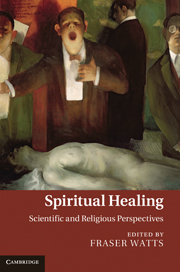Book contents
- Frontmatter
- Contents
- List of figures
- List of contributors
- Preface
- 1 Conceptual issues in spiritual healing
- 2 The historical Jesus and healing: Jesus' miracles in psychosocial context
- 3 The theology of spiritual healing
- 4 Healing the spirit: mystical Judaism, religious texts and medicine
- 5 Conceptualizations of spiritual healing: Christian and secular
- 6 The psychodynamics of spiritual healing and the power of mother kissing it better
- 7 Spiritual healing in the context of the human need for safeness, connectedness and warmth: a biopsychosocial approach
- 8 Modelling the biomedical role of spirituality through breast cancer research
- 9 Spirituality and health: assessing the evidence
- 10 Relating spiritual healing and science: some critical reflections
- 11 Concluding integration
- Bibliography
- Index
8 - Modelling the biomedical role of spirituality through breast cancer research
Published online by Cambridge University Press: 04 February 2011
- Frontmatter
- Contents
- List of figures
- List of contributors
- Preface
- 1 Conceptual issues in spiritual healing
- 2 The historical Jesus and healing: Jesus' miracles in psychosocial context
- 3 The theology of spiritual healing
- 4 Healing the spirit: mystical Judaism, religious texts and medicine
- 5 Conceptualizations of spiritual healing: Christian and secular
- 6 The psychodynamics of spiritual healing and the power of mother kissing it better
- 7 Spiritual healing in the context of the human need for safeness, connectedness and warmth: a biopsychosocial approach
- 8 Modelling the biomedical role of spirituality through breast cancer research
- 9 Spirituality and health: assessing the evidence
- 10 Relating spiritual healing and science: some critical reflections
- 11 Concluding integration
- Bibliography
- Index
Summary
In City of God, Augustine recounts the story of a woman he knew in Carthage named Innocentia. She was diagnosed with breast cancer and told by the physician that she could perhaps delay death through amputation, but that the disease was incurable. According to Augustine, she turned in prayer for help from God alone, and was told in a dream to wait at the baptistery for the first woman who came out after being baptized. She was then to ask for this woman to make the sign of Christ over the cancerous breast. When Innocentia did as she was told, she was completely cured. However, her physician was initially upset and disappointed at her account, thinking that such a cure might have perhaps enabled her to convey some great discovery to him in the healing arts (Shelley2000, pp. 113–43).
Jones defines spirituality as ‘the hope in something greater than ourselves’ while ‘religion is a community of shared spiritual values’ (2006, pp. 26–7). We propose that spirituality can significantly enhance the likelihood of physical healing in the face of disease. In the following review, we share our own work and that of others in the field of breast cancer research. We do so in order to provide evidence in support of proposed biomedical pathways through which faith, such as that expressed by Innocentia, can lead to scientific discovery within the healing arts.
- Type
- Chapter
- Information
- Spiritual HealingScientific and Religious Perspectives, pp. 128 - 139Publisher: Cambridge University PressPrint publication year: 2011
- 2
- Cited by



